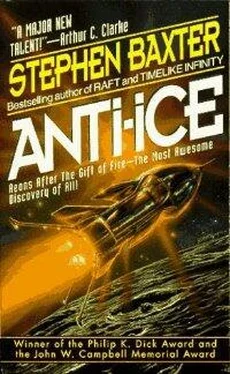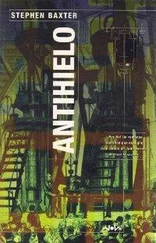“In all probability, such discrepancies would never arise,” said Traveller, “and if they did they would be resolved in an amicable fashion. Each man would know his place, and assume it without comment or complaint for the common good.”
“Pious nonsense,” Holden snapped, by now quite red-faced; and I found myself forced to agree with him for once.
“And,” I went on, “if we once lived in a naturally lawless state, like animals—”
“Not animals, Ned,” Traveller corrected me. “As free men.”
“But if this is so, then why do we have laws now?”
Traveller smiled, and the light of ancient lunar seas shone from his platinum nose. “Perhaps you should be a philosopher, Ned. These, of course, are the questions with which right-thinking men have wrestled for many years. We have laws because there are certain individuals—I would include all politicians and princes—who require laws to subjugate their brothers, in order to achieve their own vainglorious ends.”
I considered these remarkable sentiments. The England I knew was a rational, Christian country, a society informed by industrial principles and confident of its own power and lightness—a confidence fueled largely by the industries to which Traveller’s anti-ice inventions had contributed so significantly.
But here was a man at the very heart of all this technological achievement, espousing the ideas of an idealistic Russian! I wondered, not for the first time, at the power of the experiences—in the Crimea and elsewhere—which had led Traveller to such conclusions. And I wondered how such experiences might have modulated the views of one such as George Holden…
Meanwhile Holden had pulled himself closer to us. His fury showed in the beetroot color of his round face, and in the way his chest strained against the buttons of his waistcoat. “You sail close to treason, sir.”
Again I urged him to apologize; again Traveller waved me down. He said calmly, “I will forget you said that, Holden.”
Holden’s fleshy jowls trembled. “And have you forgotten the bombs thrown by your Anarchist companions? Only the rule of law stands between the freedoms enjoyed by a British gentleman and the actions of one such as Bourne, who would kill for a flag, a piece of colored cloth!”
“Perhaps,” Traveller said—and then he shouted back, “But so would you, sir, murder for such a reason!—For it was you who had to be physically restrained from throwing the poor chap straight out through the air cupboard—”
“Is everything all right, gentlemen?”
The cool, rational voice of Pocket, who had pushed his head and shoulders through the open hatch- way, caused us to stop. Suddenly we became selfconscious; Traveller and Holden were arranged like two tin soldiers in a box, upside down compared to each other and roaring abuse at each other’s toecaps; while I hung in the air at an indeterminate angle between them, ineffectually trying to calm the situation.
We moved away from each other, pulling down our waistcoats and harumphing selfconsciously. Traveller reassured Pocket that everything was in order, and suggested that perhaps some tea might knit together our troubled community. Pocket, imperturbable, said he would proceed with this straightaway, and popped his head back through the hatch. Holden was still purple with rage, but he was making a visible effort to control himself; Traveller was quite unmoved. “Well, gentlemen,” he said, “a fine impression we have given of the Island Race to our Gallic friend below. Perhaps we should stick to uncontroversial subjects in future?”
“I think that would be a very good idea, sir,” I said fervently.
“Now then, Ned,” Traveller said, turning once more to his navigation device, “where were we?”
I studied the map of Earth once more. “You were saying that this is a navigation table.”
“Exactly.”
Now I pressed my nose close to the tabletop. Around the central map, I saw, the table was perforated by an array of small holes, so that the surface was like a coarse wooden sieve. A line of tiny metal flags, gaily colored, protruded from some of the holes; the trail they marked emerged from the surface of the Earth and swept off along a graceful curve. The meaning of this was not hard to deduce; it was a representation, on a flat surface, of our path through space. “But how is this maintained?” I asked Traveller. “From your maps and charts?”
Traveller smiled. “Watch for a few minutes.”
We hovered over the table—Holden included, his breathing still rapid but his color fading fast—and were at last rewarded with the sight of a new flag popping spontaneously through a hole. At the same time, I became aware that the disc-map was also turning, slower than the hour-hand of a clock. “So,” I said, “the table maintains itself automatically. The map turns with the Earth—once every day, I should judge—and the flags emerge from the surface as we surge forward into space.”
“Correct,” Traveller said briskly.
“But how is it done?”
“There is a clockwork mechanism to drive the orrery—the turning Earth. In fact the whole device was constructed, to great precision, by the younger Boisonnas, clockmaker of Geneva. But the secret of the navigation tracking device is an arrangement of gyroscopes, suspended within the body of the table.”
As usual I was baffled. “Gyroscopes?”
Traveller sighed. “Little spinning tops, Ned. Spinning objects retain their orientation in space, as you may know—that is another reason the rocket engines are designed to impart a spin to the whole of the Phaeton —and so the table is able to ‘sense’ the turnings of the ship’s path. This, coupled with springloaded devices to measure acceleration, is sufficient to determine the position of the ship at any time, without reference to the stars at all; one could black out the windows of this Bridge and still be confident of one’s navigation to within a few miles, thanks to my ingenious arrangement.”
Holden was tapping the table with a forefinger, close to the surface of the model Earth; he was indicating, I saw, the representation of England, and in particular a heavy black line which passed from the central Pole, through London, and on beyond the boundary of the world by several thousand miles. “And this?”
“The Greenwich Meridian, of course,” Traveller said impatiently.
Holden nodded, calmly enough, but caught my eye; and we both pondered the unconscious symbolism provided by this surprising gentleman-Anarchist: for here was the worldwide symbol of British rationality and science, sweeping beyond the surface of the Earth and on to the stars.
I traced the line of position flags as it swept depressingly far from Earth’s surface; soon, I saw, we would leave the boundary of the navigation table altogether. I mentioned this to Traveller. “I admit I had not envisaged traveling quite so far in this untried craft,” he said. “But the table will not be without its uses.” So saying he popped his head below the table and rummaged through a cupboard set into the deck; he emerged holding rolls of paper some four feet wide, which he proceeded to unroll and lay flat against the table. He revealed a map designed in four sheets and marked with the imprint of Beer and Moedler. “From this rather fine Mappa Selenographica,” Traveller said, “which I carry to facilitate telescopic observations from above the atmosphere, I intend to improvise an analogue of the table’s polar-view Earth maps. A little adjustment of the gearings and the table should serve us in as good stead as we arrive at our destination…”
Traveller beamed at this further exhibition of his own inventiveness, his eyes fixed on the chart; but Holden and I exchanged despairing glances, and then looked down at the chart in silence. At that moment the cares and struggles of Earth did indeed seem distant and remote; for this “Mappa” showed the dead seas and airless mountains of the world to which we were, it seemed, irrevocably headed: it was a map of the Moon.
Читать дальше












